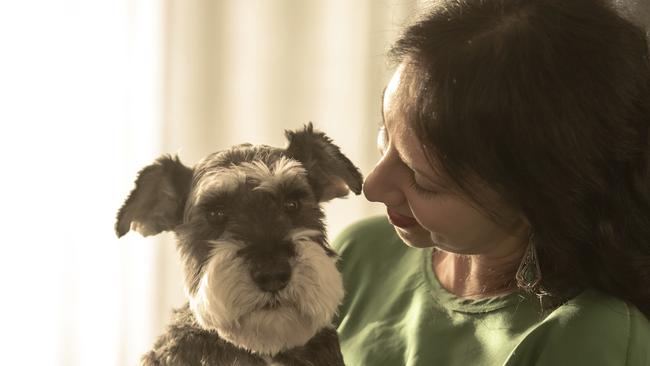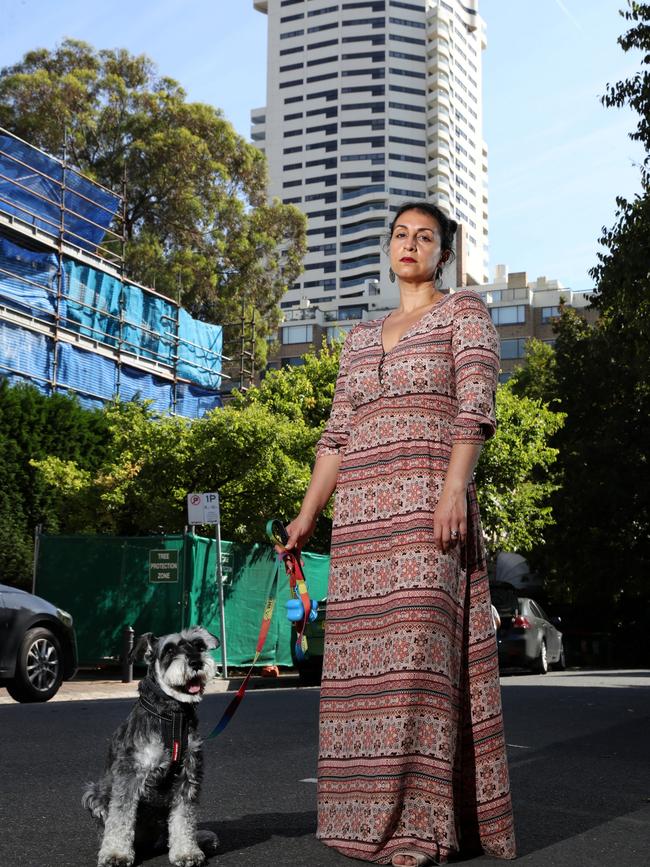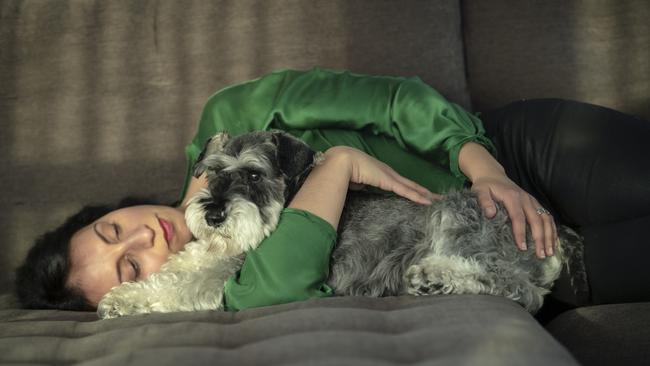The curious incident of the dog in the high-rise
The day her miniature schnauzer urinated in the lobby of her lavish Sydney apartment block is one of the most traumatic of Jo Cooper’s 30-plus years.

The day her miniature schnauzer urinated in the lobby of her luxury Sydney apartment block is one of the most traumatic of Jo Cooper’s 30-plus years. It was a mostly unspectacular spring day two years ago and Angus, her adored pooch, was already showing signs of ageing. He had kidney stones and arthritis – but not incontinence – among his host of ailments when he suddenly let loose on the shiny tiled foyer of one of the city’s most prestigious addresses. “In 14 years, that was the first and last time Angus ever peed inside,” Cooper recounts now, still cringing at the memory of that seemingly random event, with its scent of drama that would linger within the designer walls of The Horizon apartment block long after Angus’s mess was cleaned up. “I was sweating. I thought I was going to have a heart attack,” she recalls. “I thought, ‘This couldn’t have come at a worse time’.”
There is never a good time for a dog to wee in a lavish foyer, although Cooper insists it’s not much different to the coffee and salad spillages she has witnessed over five years of living in the award-winning, officially pet-free building. Soaring over a neighbourhood of low terraces, the 43-storey tower was designed by renowned architect Harry Seidler in the 1990s. Residents of the 236 units, many with harbour views, have included actors and celebrity hairstylists, film director Baz Luhrmann, MONA’s David Walsh and the late celebrity agent Harry M. Miller. Kerry Packer’s 25-year-old granddaughter Francesca Packer-Barham is reportedly the new owner of a whole-floor penthouse that sold in October for almost $16m.
“People have vomited in our gym, in the foyer,” Cooper continues. “What’s the difference to a dog peeing once?” Still, a mix of pride and mortification saw her race Angus up to her lower floor apartment, where he had been living for years. “I threw him in the house, got all the disinfectant wipes and I am wiping it – no one had stepped in it – and I went straight to the concierge to inform them that Angus had peed and I’d cleaned it straight up.” But, not, it turns out, entirely. “Apparently I missed a few drops.”
What followed is now on the public record. As the NSW Civil and Administrative Tribunal found in November, having watched all 17 minutes of security camera footage of the episode: “The evidence of the [owners’ corporation] was that [Cooper] had wiped up the puddle but not a trail of drips to the lift; [Cooper] disputed this and said she was not told anything to the contrary by the concierge. In the short intervals between each event just described, several people had entered or exited the lift lobby, avoiding the urine pool but possibly not the drips, although none seemed to react as if they had trodden in anything untoward. It was otherwise not possible to tell if any of the drips had been walked in by those entering or exiting the lobby before the final cleaning.”
While the episode was unseemly, it was Angus’s very presence in the building that had brought Cooper and her co-owners to the tribunal, each side bolstered by a retinue of lawyers as part of a dogged drama that has so far spanned five years and hundreds and thousands of dollars in legal costs. And it’s far from over. Next month, Cooper and her co-residents face off in the NSW Court of Appeal in a case that could have far-reaching consequences for strata residents. “I see this [case] as a challenge to the democratic process by which owners choose to live. It just happens to be about a schnauzer,” says solicitor Stephen Goddard, who until February was chairman of the Owners’ Corporation Network for 18 years. “These proceedings are challenging the democratic processes by which strata meetings are conducted.”
And all because Cooper bought into a building where pets were banned. “So we put in a motion to change the bylaw,” she says. “But it’s like I committed murder.”

Jo Cooper is a vivacious woman. A singer-songwriter, she is chirpy, vocal by her own assessment, and forthright. But her manner alters perceptibly when she unlocks her apartment door. After a lively walk from her favourite cafe, her tread lightens and slows and her voice becomes a whisper as she steps into her bright, perfectly maintained living room, where, on a plush pillow in the afternoon sun, Angus, deaf and partially blind, is sleeping.
“Hi baby, hi my beautiful boy,” she coos as Angus rouses and struggles to rise. “Are you comfortable? Yeah baby, it’s OK, there you go,” she continues gently, her voice now just above a whisper as her pet totters and eases himself onto the loungeroom floor. Now 14, Angus has been with Cooper since he was a puppy. “I don’t have children, I have a dog,” she says. “Pets just make you better. You open the door and they’re so excited to see you. They’re so loyal. They keep you calm. If it wasn’t for Angus I wouldn’t have been able to go through this. You just cuddle him and everything falls away.”
Carefully dressed in a designer jacket, her dark hair neat, Cooper is standing beside the living room’s floor-to-ceiling window with its views of the city skyline. Her home is a pristine oasis, two bedrooms, two bathrooms and two parking spaces, the precise combination she and her partner were seeking when they first inspected this oversized apartment five years ago. Cooper loved what she saw, as have many others. “It’s a beautiful, unique property,” says former public relations executive Jackie Crossman, who moved in to The Horizon 15 years ago. “It’s got great 24-hour concierge service, we have beautiful grounds, lovely resort-style facilities, very premium. It is, in my view, unrepeatable.” Apart from the tennis court, pool and 500-car garage, for many residents there’s also a cherished sense of community with an in-house book club, a theatre group, and BYO drinks for all residents four times a year. For Cooper, a big attraction is the location in inner-city Darlinghurst, with its wealth of cafes and restaurants. “I feel at home here,” she says of her neighbourhood. “This is where I feel safe. There’s dogs everywhere. Everywhere.”
The question of canine ownership does not appear to have been raised during inspections of her future home. “He [Angus] has always lived in strata. And it’s never been an issue.” But some time before the purchase was finalised “we did know that it wasn’t pet-friendly”, she says of the bylaw.
By then Cooper had already owned Angus for nine years. So why buy in? “We knew there were pets in The Horizon,” she says, a claim supported by some residents and refuted by others. “My immediate reaction was it’s just an outdated bylaw. When we moved in there were four pets on our floor alone. Our neighbours had two dogs, another resident had a dog and another resident had a cat. We saw them in the foyer of my floor and we heard them.”
“I had a cat for 10 years,” says Jackie Crossman, referring to Tawgress, a Bengal that died five years ago. “I already had her when we moved in. I did know about the pet ban but I was told by the real estate agent that there were a number of pets in the building, and it was up to me if I would take a risk or not.” So Crossman did, and Tawgress remained mostly inside. When she needed to take her to the vet, Crossman would reserve the goods lift and take her down to her car in the loading dock, out of sight of other residents. “Everybody on my floor knew we had her,” she insists.
So there are pets in the building? “Where is the proof of that? This is a statement that is sometimes made. I haven’t seen them,” insists nuclear medicine specialist Dr Bob Dickinson, who has lived on the 38th floor since late 1998, months after the building opened. “There were occasions maybe back in the late ’90s when a couple of people had pets. But they were asked to remove them and they did.”
Marlyn Robertson, chairman of the owners’ corporation, claims to know of only two pets on site, Angus and another canine. “All I can promise you is that whatever pet has been seen, it has been reported and action has been taken.” And retired magistrate Gail Madgwick claims never to have heard or seen a pet on the premises until weeks ago – and she has lived on the same floor as Cooper and Angus for years.
“There have been some other owners who had dogs,” concedes lawyer Richard Gration, a resident for 20 years and former chairman of the owners’ corporation. He recalls several pets being discovered and then removed by residents during his time on the voluntary committee, although no animal-related episode was quite as dramatic, he says, as “the great kitty litter catastrophe of 2004”.
A clandestine cat owner had been flushing the pet’s litter down the toilet, where it blocked the main sewer pipe. “A resident on level four woke up at midnight with this awful smell and gurgling sound,” recalls Gration. In the ensuing flood, raw sewage, ankle deep, damaged multiple apartments so badly they had to be refitted. “We worked out immediately where it came from and the renter was so embarrassed that they… moved out the following week,” says Gration, who adds that he has no issue with pets per se. “I absolutely love dogs. As a personal choice I wouldn’t have a dog in an apartment because I think it’s unfair on the dog. But it’s certainly not about hating animals. The more important underlying issue is, how do you decide this? You do it through a democratic process. And you accept the result. And if you don’t like the result, that’s fine, you go about changing people’s minds, you try to persuade them.”

Jo Cooper figured the best option was to amend the rules. In September 2015, only months after moving in, she tried to have the bylaw changed at an extraordinary general meeting of owners. In the lead-up, she maintains, she was subjected to verbal attacks. “I’ve been called a ‘f..king disgrace’ to my face,” she says. “There was also a time a man called me a stupid little brown girl and said I would be gone in a week… And that really shattered me. I’d never really experienced racism before. And it was probably the first time I really thought this wasn’t about pets. It was about me challenging the status quo.”
She lost that bid to change the bylaw. But she recalls being told informally by a committee member that pets could be smuggled into the building if they caused no trouble. “Sneak your pet in because it’s easier to control, that’s the accepted norm.” So in January 2016 she moved Angus into her apartment, hiding him in an open backpack to take him outside up to three times a day.
But nothing more, it seems, was said. For two years she snuck Angus in and out of her unit in the backpack, seemingly undetected. “I didn’t know anything about the dog until she brought him through common property,” says Robertson, who was not yet chairman. Then, in 2018, Angus’s spine began to deteriorate and he spent weeks at the vet’s surgery. “It caused me so much stress putting him in that bag,” Cooper recalls. “After he got sick I thought, ‘I can’t do this anymore’.”
In August that year Cooper started walking Angus in and out of the building on a lead, later advising the owners’ corporation that her dog was living in the unit and she was happy to talk through concerns about taking him through common areas. “The strata committee doesn’t have any power to do a mediation,” says Robertson. “We are there on day-to-day stuff. We try to protect the bylaws and meet our budget. Major decisions have to be made by the whole community.” Determined that her pet would live with her legitimately, Cooper tried several more times to change the bylaw and failed. And then Angus peed in the foyer.
She’d been feeling increasingly frazzled about her dog’s health and living arrangements, and by that morning in October 2018 Cooper had noticed Angus was shaking. “He was picking up on my energy. I ran to the vet and he said, ‘There’s nothing wrong with Angus. There’s a lot wrong with you.’ So I’m sort of relieved but I feel guilty because I didn’t want him to feel that way.” On the way home, she walked Angus through the foyer and as they stood at the lifts he urinated on the tiles.
The incident would turn out to be a marker in more ways than one, because the question of Angus soon escalated. Cooper was issued with the first of multiple notices by the owners’ corporation for walking or carrying her dog through common areas and was told he had to leave. Later that year she tried again at the AGM to change the rules, but if anything the voice of other residents seemed more resounding, with almost 90 per cent of those who voted opting against changing or repealing the bylaw. “That’s just the nature of our democracy, isn’t it?” says Dickinson, who spent a decade on the owners’ committee. “The majority of the people in the building were happy with the bylaw and wished to maintain it.”
And enforce it. In April last year, having issued multiple notices to Cooper for breaches of the bylaw, the owners’ corporation tried to have Angus permanently removed from the property. Lawyers were summoned. Emotions soared. “It’s not just another issue. It’s very important and it’s been very divisive,” says Robertson. “Somebody said to me recently that you don’t know who to talk to these days because the points of view are so polarised because this has been going on now for years.”
Should Angus go or stay? Would pet ownership trump majority rule? In November, Angus won a major reprieve when the NSW Civil and Administrative Tribunal found the bylaw to be “harsh, unconscionable and oppressive”, declaring: “The OC [owners’ corporation] has first relied on the consistent pattern of voting on the topic over the years which indicates that the owners like the scheme the way it is. But simply liking something the way it is does not answer the allegation that it is harsh, unconscionable or oppressive in the context and circumstances of a particular strata scheme…”
Some owners were jubilant. Angus could remain in the building. Others were incensed, and wondered about the implications for the many other buildings that had adopted a similar bylaw, one of several models offered by the NSW government as guides for strata rules. The owners’ corporation successfully appealed the verdict to a higher panel of the tribunal in May. But the struggle was not over. Because of perceived errors of law in the most recent judgment, Cooper is taking the case to the NSW Court of Appeal, where the matter will be heard in September.
In the meantime, Angus has been given permission to continue his residence pending the decision of the Court of Appeal, a move that may well have emboldened some like-minded neighbours. In recent weeks several long-term residents, who have never previously known of pets on the premises, have reported several sightings.

Despite his precarious living arrangements , Angus is hardly alone. Around the corner at the luxury Elan building in Kings Cross, the owners’ corporation also had a win recently in their battle to uphold a pet ban. Both cases have created uncertainty, says Chris Duggan, NSW President of Strata Community Association, the peak body for the strata industry. But it’s the ongoing legal battle at The Horizon causing wider anxiety about the strength of any bylaws that have been endorsed by the majority. “It sounds trivial,” says Duggan, “but these buildings don’t find it trivial at all; then it becomes a proxy for whether the rule of law applies and just which bylaws are enforceable.”
Pets continue to be one of the three main areas (with parties and parking) where conflict occurs within strata bodies, says former Owners’ Corporation Network chairman Stephen Goddard. “When people move into strata schemes they often do not understand that they are losing part of their liberty,” he says. “They have purchased cubic air space, not land.” A former Horizon resident himself – his partner had to give up two dogs when they moved in – he says the outcome of Cooper’s legal proceedings could have wider implications for NSW unit blocks, potentially encouraging others to introduce pets in buildings where they are currently banned.
Lawyer David Bannerman, who has previously represented Cooper, agrees the case goes way beyond the rights of one dog. “Should owners have the right to create harsh arbitrary laws, or should the tribunal have the right to overrule those laws?” he asks. “Attitudes change over time.”
Five years on, the fight for Angus’s home and its repercussions have been significant. “It has become contentious,” says Gration. “There’s an annoyance that a lot of money is having to be spent on legal costs because someone refuses to abide by the existing bylaws.” Cooper, who has to keep paying her own strata fee contributions towards the owners’ legal costs (thereby contributing towards the case being mounted against her) estimates combined legal fees to date are close to $300,000. She has started a crowdfunding campaign to support her legal costs. “This has nearly ruined my career. It’s all-consuming. I’m a creative. It’s very hard to be creative under the circumstances,” she says. “I am so sick of people saying to me, ‘Just move’… No law should be able to tell you how to move within the walls of your own home, so long as you’re respectful.”
“We are the community that lives in this building,” counters Robertson, the voice of those in favour of the status quo. “For the owners it’s about, ‘Well hey, we had a bylaw. Twenty years ago we decided this is one of the rules we want to have to be able to live together comfortably’.”
And they have, mostly. But behind its award-winning facade, The Horizon remains a building with divisions. “I don’t understand the resistance,” says Crossman, who would love to have another pet but only if it could legitimately live in her apartment. “There are many animals in this building. There always has been,” she insists. And besides, changing the rules could have far-reaching benefits. “If we acknowledge their presence we can ensure the kitty litter episode from 16 years ago never happens again.”


To join the conversation, please log in. Don't have an account? Register
Join the conversation, you are commenting as Logout